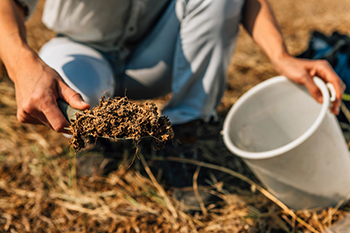Vital Testing Labs Open For Business

Maggie Lawrence
Alabama Cooperative Extension System
Farming waits for no man and no virus. Farmers across Alabama must keep their operations running while following health guidelines. To help ensure farmers have the resources they need, agricultural testing labs on the Auburn University campus are open and accepting samples.
“These labs provide farmers with important information on soil fertility, plant diseases as well as forage analysis,” said Mike Phillips, an assistant director with the Alabama Cooperative Extension System.
“Farmers can reach Extension agents and specialists by email or cell phone if they need help interpreting their lab reports,” he said. “Select the Directory tab on the Extension website, www.aces.edu.”
Phillips said the Auburn Soil, Forage and Water Testing Laboratory serves both farmers and homeowners.
Soil Testing
Both routine soil analysis, as well as more advanced testing, are available from the lab. Customers receive a report detailing soil test values, ratings and lime and fertilizer recommendations by e-mail and/or regular mail. The lab send these reports as soon as possible after they receive and analyzes the samples. Clients do not have to use a soil testing box but can simply place their sample in a resealable zipper storage bag along with the online soil sample form.
- Download a routine soil test form here.
- Download a special soil analysis form here.
- Learn more about how to submit samples here.
- Visit the Soil, Forage, & Water Testing Laboratory online.
Forage Analysis
Additionally, the lab will analyze producers’ forage and feed samples. The lab analyzes samples for percent moisture, crude protein, pH, crude fat, lignin and total digestible nutrients (TDN), as well as a number of other values.
Plant Problems
The Plant Diagnostic Laboratory at Auburn University provides three services; plant problem diagnosis, soil nematode analysis and insect identification
Plant samples at the Auburn University Plant Diagnostic Lab are initially examined by a plant pathologist. Some samples may then be referred to Extension specialists in entomology, agronomy, horticulture or wildlife.
